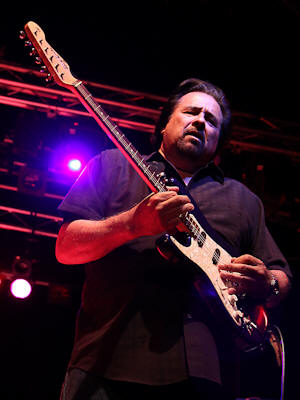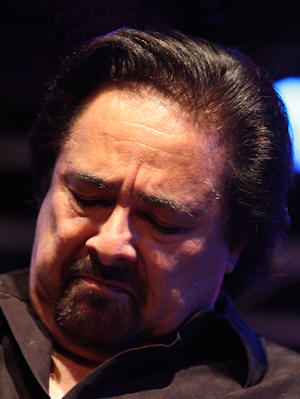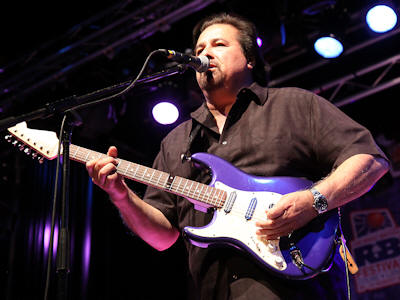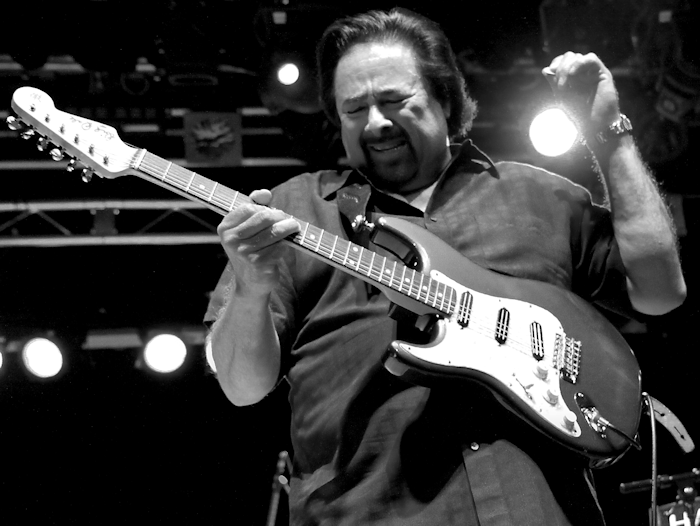
Painting © 2004 Loz
Arkle
Website
© Copyright 2000-2011 Alan White - All
Rights Reserved
Site optimised for Microsoft Internet Explorer



Early Blues Interview
|
|
Guitarist and vocalist Coco Montoya's 30-year career began in the
mid-70s with a chance meeting with legendary bluesman Albert Collins,
who asked him to join his band as drummer. Albert took him under his
wing, becoming his mentor and teaching him the Collins "icy hot" style
of blues guitar. In the early 80s, John Mayall asked Coco to join the
Bluesbreakers. This led to Coco touring the world for ten years with the
legendary Bluesbreakers before moving on to go out on his own in 1993.
Coco has released five albums and another is now in the pipeline. Coco
averages over 200 tour dates a year and in August 2009 he appeared at
The Great British R&B Festival, Colne, England.
Alan: Coco, thank you very much for spending a few minutes with me. I know you havenít got much time so weíll get straight on. What are your first musical memories as a youngster in California? Coco: First musical memories are probably watching television as a kid. I was fortunate to grow up in an era when we had guys like Johnny Otis with his own TV show on Channel 5 and of course all the dance shows, Lloyd Thaxton and all those guys. So I got to see a lot of great musicians and players and it was just a lot a musical influence in the family. Mexican music too, and of course the east LA soul sound was a big, big influence. I have two older sisters and an older brother so I was into the doo wap and everything else. Alan: Did you always want to become a musician? Coco: Yeah. It was always something that was there. Everything else I ventured into usually waned but this was just like a fever. Alan: So how did you get started in music? Coco: I think I did the normal things like every kid. I begged my mother for a drum kit, picked one up when I was about 11, started playing and I played drums for quite a long time. It was great and that was the beginning of it all. Then the Beatles showed up and, then, after that, getting into the Stones and that was starting to head towards blues Ė which I didnít even know at the time. A friend of mine took me to Wallachís Music City and said ďI want you to hear this band called Cream and I want you to hear John MayallĒ. Iíd never heard guitar like that in my life and that, in hindsight, started me on my journey towards blues, through Eric, and Peter Green introduced me to guys like Albert King and Freddie King. Alan: Tell me about your time playing with Albert Collins. Coco: Glorious! Not much money in it though! It was perfect timing because I was just 21 years old on the road making 40 or 45 bucks a night. If I made 70 dollars I was laughing. But it was just a glorious time. You were playing an original personís music, you werenít doing Top 40 or just a bar band, you were on the road playing Frosty and all these things . It was probably one of the most educational points of my life in just living, and learning how the world really was for these guys. Albert let me into a really incredible world, a scary world but exciting and we had a ball. Alan: You play left handed with an upside down right-handed guitar. How did that come about? Coco: Thatís pretty much self-taught. I was just talking with the bass player of The Blues Band, Gary, and we were making the same notes because we donít run into left-handed players that often or people who play the way we play. Usually itís the same thing with everybody Iíve ever talked to, like Greg Wright, great guitar player from the States, and we all just say, ďYeah, didnít know there was a left or right to it.Ē There was nobody there to tell me and I didnít seek it out, I just did it. Alan: Whoís influenced you most in your music writing and playing? Coco: I think the minute you start playing you are influenced by obscure people to the bigger stars. Of course the Beatles were a big influence on me, I think they influenced everybody no matter what kind of music you play. My first influences were the east LA soul bands which were just a whole different thing. Guys that I still look up to like Thee Midniters, The Ampertones and then later I couldnít get enough Cream, John Mayall, Alexis Korner...
Coco: That was another great period of my life, and was just being at the right place at the right time. The two biggest things that ever happened to me were Albert Collins and John Mayall. To have John Mayall call you up at you day job Ė I was bartending at Kim Gardnerís pub in Laurel Canyon (Kim Gardner from Ashton, Gardner & Dyke). I was bartending there and playing at the weekends having fun. I didnít even want to be a musician, I just wanted to be a weekend warrior. Mayall heard me at a jam session and just happened to call down the pub and said, ďMick Taylorís leaving, Iím looking for a guitar player. You want it?Ē I couldnít believe it! I was tempted to just say no because I didnít want to be in a band and I figured it was over with, but when John Mayall calls you, itís like, ďOkayĒ. You just think of a little boy sitting there listening with his buddies and wearing out the Beano album and here it falls in your lap. This was my hero and heís on the phone with me. Just him taking me under his wing and showing me where he's got and where he comes from meant I got more out of him than just music, I got better self-esteem. I watched John and he would not let anything deter him. John was very steadfast in what he was doing, he knew what he wanted and heíd go for it. If something got in his way, heíd go around it. If he slipped on a banana peel, heíd be ďOh, messed that up. On with the nextĒ. That would have destroyed me, but not John. I gained so much from him, musically, but also watching him work through life and how he wouldnít let any of the negatives in this business put him down. Alan: I read that you got to play with Lowell Fulson. Coco: Oh yeah, back in the days with Albert Collins. Like I said, he opened up a lot of doors and I played with Lowell Fulson, Shaky Jake Harris, with Peewee Clayton, Big Joe Turner Ė all these greats. I had Johnny Otis coming up to me saying I was a good player. John Lee Hooker tried to hire me from Albert. He came up to Albert and said, ďOh, I want that drummer youíve gotĒ. It was a really incredible time. I got to sit with Howliní Wolf. And then when I was with John, the only one I didnít get to meet was Eric but I got to meet Mick Taylor. Alan: I got to interview Mick a couple of months ago. Coco: Man! Heís a silly bird but I love him. Heís incredible. Mick Taylor just made me cry. Alan: Heís on here at Colne on Monday. Coco: Thatís what I heard. Iím really upset that Iím going to miss him. Heís a phenomenal guitar player and I just love him. He did something great which Iíll never forget. We were doing some shows down in Florida and, out of nowhere, because heís a shy guy, he just grabbed me by the arm and said, ďI just want to tell you. Youíre a really, really good player. You belong right where you are, here with us, with Eric, Peter, me. Youíre the real dealĒ. I have to admit I went to the dressing room around the corner and started weeping a bit. To have somebody like Mick Taylor tell you that you can play. Thatís something. Thatís what John brought me Ė meeting all these people, Mick Jagger and such. Alan: Are there any particular songs you play which have special meaning to you?
Alan: How healthy do you think the blues scene is in the UK compared to the US? Coco: Itís probably healthier in the UK. I donít know for sure exactly where musicís going in the States at this point. The world economy is obviously not doing well but the States is a rough market. I hate to say it sometime but as far as this kind of music is concerned, in itís homeground some people get a little too used to having it around. I do very little work in LA and I have to go on the road to make a living. Alan: Some music styles maybe fads but the blues is always with us. Why do you think that is? Coco: Well, I think thatís probably because itís an organic music and everything else becomes a hybrid. Iíve seen music in my life go through these very simple basic things and get more complicated and just so intensely cerebral and complicated that people go, ďStop, Iíve had enoughĒ and then theyíll hear Big Joe Turner or BB King or LaVerne Baker and theyíll go, ďOhĒ and rediscover it. Itís simplicity, itís goes back to emotion and people get connected to emotion with music instead of cerebral music. Itís kind of a cycle. Alan: What about your future plans? Coco: Iím going to be 58 this year, and Iím very blessed to be this old. I plan to just keep working until I drop. Itís what I do for a living and itís what I do to live. I love playing and as long as my health holds out I plan to just continue playing and doing albums. Iíve just signed with Thomas Ruf's Ruf Records so thereís a new album coming out next year being produced by Keb' Mo' and Jeff Paris. Alan: Have you got a title for it yet? Coco: Yes, itís called I Want It All BackĒ and itís a departure, a little different but thatís what I like as itís taking me out of my comfort zone. Alan: Have you got anything to say about the festival here at Colne? Coco: Are you kidding - this is great! I had a ball, I had a great time and I hope the people did too. One of my treats here was to see The Blues Band as I havenít seen them in a while. I havenít talked to Paul in quite a long time. I recorded their Canít Get My Ass in GearĒ on my second album and I get big calls for that one. Theyíre a great band. Alan: Thank you so much Coco and thank you for waiting to see me.
Return to Blues Interviews List
Website, Photos © Copyright 2000-2009 Alan
White. All Rights Reserved. |





 I
had arranged to interview Coco Montoya the morning after his set at the
Colne R&B Festival, but as bad luck would have it, Coco arrived whilst I
was interviewing Deborah Bonham. Explaining to Coco that I wouldnít be
too long, he graciously agreed to wait and even delayed his taxi which
was due to take him to the airport (this was getting silly Ė headling
stars queuing to be interviewed!).
I
had arranged to interview Coco Montoya the morning after his set at the
Colne R&B Festival, but as bad luck would have it, Coco arrived whilst I
was interviewing Deborah Bonham. Explaining to Coco that I wouldnít be
too long, he graciously agreed to wait and even delayed his taxi which
was due to take him to the airport (this was getting silly Ė headling
stars queuing to be interviewed!). Alan:
So, tell me a bit about your time with John Mayallís Bluesbreakers.
Alan:
So, tell me a bit about your time with John Mayallís Bluesbreakers. Coco:
Lots of them. Iím a pretty emotional guy so when it comes to
interpreting songs, I play emotionally rather than technically. I never
think about what Iím going to do, itís more of a feel. Right now Iím
doing a song in the set called Good Days, Bad Days by Gary
Nicholson and itís kind of a love ballad but itís taken on a different
meaning for me because I just lost my sister a few days back and so,
once again, music is the healer. Last night when I did Have you
Heard, itís a tip of the hat to John Mayall and to Eric but itís an
emotional thing to me because I remember how it made me feel when I
first heard it with Eric playing. To me I heard an angry young man in
there playing guitar and venting. So yes, I come from an emotional
place to be able to play that and Iíve got to a place where I feel I can
play that and give John and maybe Eric an opportunity to smile and say,
ďI had something to do with thatĒ.
Coco:
Lots of them. Iím a pretty emotional guy so when it comes to
interpreting songs, I play emotionally rather than technically. I never
think about what Iím going to do, itís more of a feel. Right now Iím
doing a song in the set called Good Days, Bad Days by Gary
Nicholson and itís kind of a love ballad but itís taken on a different
meaning for me because I just lost my sister a few days back and so,
once again, music is the healer. Last night when I did Have you
Heard, itís a tip of the hat to John Mayall and to Eric but itís an
emotional thing to me because I remember how it made me feel when I
first heard it with Eric playing. To me I heard an angry young man in
there playing guitar and venting. So yes, I come from an emotional
place to be able to play that and Iíve got to a place where I feel I can
play that and give John and maybe Eric an opportunity to smile and say,
ďI had something to do with thatĒ. 